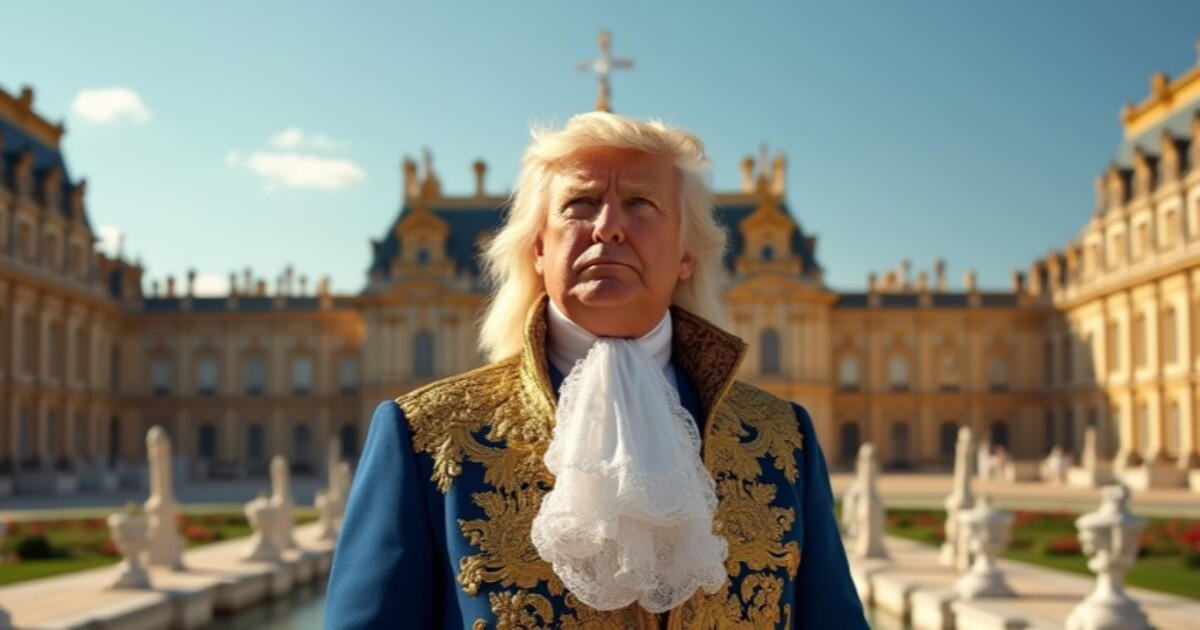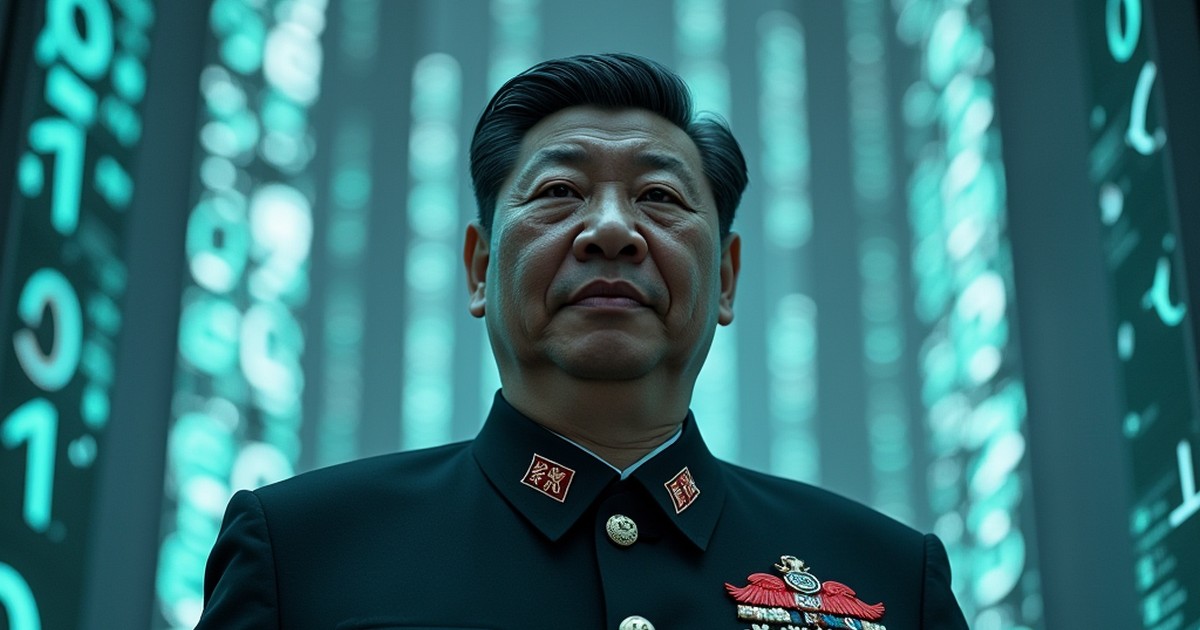Donald “L.” (as in Louis) Trump: The Sun King Reloaded?
All across the world, people wonder who the 47th U.S. President really is. How about a parallel from French history?
December 6, 2024

Yes, I know, Mar-a-Lago isn’t quite Versailles. But it isn’t just on his Florida residence that Donald Trump demonstrates a great penchant for garish, gold-layered interior designs.
Matters of design and an irrepressible urge for an opulent lifestyle aside, comparing the President-elect of the United States to France’s king Louis XIV., known as the “Sun King,” is actually quite revealing politically.
As a quick deployment of the world’s best AI tool makes plain, Louis XIV. was characterized by altogether ten distinctive features and actions that shaped his reign and his role in French history.
Indeed, King Louis XIV., the “Sun King”, was characterized by altogether ten distinctive features and actions that shaped his reign and his role in French history. Donald Trump definitely essentially fulfils eight of them.
1. Absolute power
Louis XIV. is credited with embodying absolute monarchy to perfection. The late 17th century French king saw himself as a divinely appointed ruler who ranked above all other human beings, notably including above the law.
All state power was in his hands, and he exercized legislative, executive and judicial power.
Assessment: Donald Trump isn’t quite there yet, but Louis XIV’s power set-up very much describes the governing ambitions of his German-origin counterpart. Therefore, count this as a fit.
2. Centralization of power
Louis XIV. centralized the administration of France by having provinces and cities run by officials who were entirely dependent on the king. The nobility were stripped of their political rights, but did not have to pay taxes.
Assessment: Also a fit. Even though the U.S. system of government – unlike that in France at the time of the Sun King – is largely based on the power the altogether 50 federal states hold, Mr. Trump is trying to streamline this process as much as he can.
For example, Republican governors are supposed to fall in line with his preferences and predilections voluntarily. As for states (still) led by Democrats, the goal is to use federal powers to force them to fall into line with rule-by-Trump.
As far as today’s U.S. “nobility” is concerned – the top 1% of the U.S. income distribution – Mr. Trump, in contrast to Louis XIV. – can’t completely exempt today’s billionaires from paying taxes, but he is doing his darndest to get close.
3. Palace of Versailles
The Palace of Versailles, which served as the king’s official residence and was an expression of his absolute power and splendor, became the model for many other palaces in Europe.
Assessment: Basically a fit. Mar-a-Lago is a contemporary attempt to emulate the grandeur of Versailles. But for all its expanse and the expense it represents, Trump’s Florida residence obviously falls short of the latter’s 700 rooms and magnificent gardens.
Of course, while Trump likes to incorporate gold glitter basically everywhere – including in the design of the Fifth Avenue Trump Tower, it is simply a tasteless and cheap imitation of the Hall of Mirrors in the Palace of Versailles.
In his defense, Donald Trump can rightfully claim that real estate prices for land in the wider Miami area are way above those of France in the late 17th century, even though one surmises that, Louis XIV. didn’t pay a dime for the land.
4. Court life and morning ritual
Life at the Palace of Versailles was characterized by an incomparable cult surrounding the person of the king. The public morning ritual (“Lever du roi”) was an example of this, at which more than 200 people, not just servants(!), were present to pay homage to him.
Assessment: Not a fit on this one. For all of Trump’s pride, arrogance, vanity and need to be ceaselessly admired, this one is a no-go area for the incoming U.S. President. He is often described as a germophobic man, probably close in style to Michael Jackson.
Mr. Trump would be abhorred by the idea of having even other senior MAGA Republicans as well as big spenders on the MAGA cause – the nobility of the Trump era – present when doing his morning toilette.
But then again, the hoisting of the wig as an integral part of getting ready each morning would be one moment that Louis and Donnie share.
5. Cultural and scientific promotion
During Louis’ reign, the arts, culture and sciences flourished. He supported important artists and founded academies for painting, sculpture and science. This also served as an instrument of power to attract the French aristocracy to the court and monitor them.
Assessment: Not really a fit. Trump would simply ask: What are arts, culture and sciences? However, festive balls held in honor of the American King all across the land to regale the cronies and the wider (Republican) public would be considered OK by the President-elect.
6. Military expansion and wars
Louis XIV. waged many wars, especially against Austria and the House of Habsburg, in order to secure France’s supremacy in Europe.
These wars and the associated costs placed a heavy burden on the French state budget and contributed to the country’s poverty after his death.
Assessment: Here again, to a considerable extent, Trump is parting ways with Louis XIV. He believes the United States has been engaged in enough hot wars, although he has a definite taste for a hard-fought Cold War against Xi’s China.
As to the other part of that equation – placing a heavy burden on the national budget – Trump has learned from his pal Louis.
Not only does Trump not want to enter into costly wars, but he wants to make his allies pay for the defense posture provided to them by the United States (“I want my money back”).
Moreover, he needs to reserve all the debt-making capacity (and more) that the U.S. federal government has to continue the core legislative initiative from his first term in office – “paying” for tax cuts for the rich.
7. Economic policy
Louis XIV. put Jean-Baptiste Colbert in charge of economic policy, who introduced the system of mercantilism to strengthen the state budget. However, this also led to higher taxes for the subjects.
Assessment: A fit, with one notable difference. In order to assure his role as center of (at least) the American universe, Trump reserves the role of the key economic decision maker for himself. In that sense, Trump is both Louis XIV. and Colbert.
In addition, to reach the highest amount of absolute power possible, Trump is keen to soak the field with many economic pawns (i.e., underling decision makers) with a certain divergence of views, although all of them basically sharing the Trump world view on economic matters.
For reasons of courtly self-entertainment, these courtiers are all meant to vie for his attention. Trump’s plan is to keep them all guessing, playing cruel games with their egos while pushing their level of self-respect to ever lower levels.
8. Self-perception and legitimacy
Louis XIV. was convinced that he had an infinitely higher standing than the entire rest of society and saw his rule as the will of God. His famous sentence “I am the state,” although he never uttered it himself, reflects his unrestricted power and self-perception.
Assessment: Simply a perfect fit.
9. Lust
Louis XIV. was known for his admiration of women. Once peace with Spain was secured, it is reported that “the king took what he pleased,” including many mistresses. He obviously used his lavish lifestyle as a big factor of attraction.
Assessment: A near-perfect parallel. For Trump, reports about the conquest of women have always played an ego-boosting role in Trump’s ego-driven life.
In addition to having married three trophy wives, he has always made a big point of referring to an infinite number of dalliances in order to prove his vitality and manliness.
10. And finally: The symbol of the sun
The sun was the central symbol of the government of Louis XIV. Just as the sun is the center of the solar system, he saw himself as the center of France.
This was reflected in his motto and self-perception. As a matter of branding, he also saw to it that the sun was placed as a symbol on prestigious objects and official documents.
Assessment: No doubt, Donald Trump finds himself totally aligned with the world view of the Frenchman from the 17th century. Like Louis XIV., Donald Trump sees himself as the center of the world, if not the universe.
And like the French king, Trump is very keen on branding. He has literally put his name on every single product and every real estate project he has ever come up with.
However, for the people of the United States and indeed people all around the world, the relevant question regarding the sun as a factor in the Trump equation is this: Will Donald Trump end up as an octogenarian Icarus, flying the U.S. state ship far too close to the sun, thus disregarding the strict advice of his parental guardian, Daedalus?
Donald Trump’s family history offers little solace with regard to preventing a crash. After all, his youth and much of his business career is widely regarded as an eternal revolt against an (admittedly oppressive) father.
Conclusion
The hope, both for the United States and globally, must be that especially U.S. Senators representing the Republican Party, rising to the claim that they serve in the world’s most deliberative legislative body, will collectively be more successful in restraining the octogenarian firebrand.
Trump’s youthful and definitely radical “Sturm und Drang” attitude is a problem for both political parties in the United States. After all, seasoned politicians want to make sure that they have a viable and promising future after the end of rule by Trump.
The only difference between the two parties is that the Republicans say that Trump going full-bore “Sturm und Drang” is a big “IF,” while the Democrats assume it is merely a matter of WHEN Trump may be willing to run the risk of crossing the line to perdition.
Takeaways
Donald Trump has been called a fascist and, at times, been compared to Hitler. All across the world, people wonder who the 47th U.S. President really is. How about a parallel from French history?
Comparing the President-elect of the United States to France’s king Louis XIV, known as the “Sun King,” is actually quite revealing politically.
As far as today’s U.S. “nobility” is concerned – the top 1% of the U.S. income distribution – Mr. Trump, in contrast to Louis XIV. – can’t completely exempt today’s billionaires from paying taxes, but he is doing his darndest to get close.
Will Donald Trump end up as an octogenarian Icarus, flying the U.S. state ship far too close to the sun, thus disregarding the strict advice of his parental guardian, Daedalus?
Donald Trump’s family history offers little solace with regard to preventing a crash. After all, his youth and much of his business career is widely regarded as an eternal revolt against an (admittedly oppressive) father.
The hope, both for the United States and globally, must be that especially U.S. Senators representing the Republican Party will collectively be successful in restraining the octogenarian firebrand.
Trump’s youthful and definitely radical “Sturm und Drang” attitude is a problem for both political parties in the United States. After all, seasoned politicians want to make sure that they have a viable and promising future after the end of rule by Trump.
The only difference between the two parties is that the Republicans say that Trump going full-bore “Sturm und Drang” is a big “IF,” while the Democrats assume it is merely a matter of WHEN Trump may be willing to run the risk of crossing the line to perdition.

